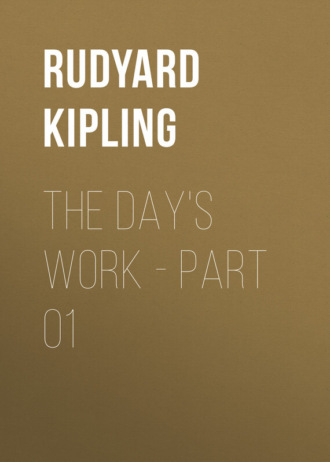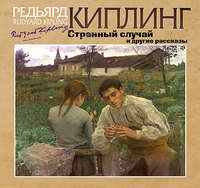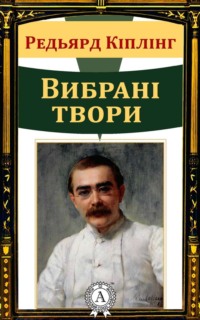 полная версия
полная версияThe Day's Work - Part 01
I asked Adam this on my own account. He put his head on one side for a moment and replied: "In these days I think about great things; I do not play with Victor and the cow's child any more. He is only a baba."
At the end of the third week of Strickland's leave the result of Strickland's labours — labours that had made Mrs. Strickland more indignant against dacoits than any one else — came to hand. The police at Peshawur reported that half the Shubkudder Gang were held at Peshawur to account for the possession of some blankets and a horse-bucket. Strickland's Assistant had also four men under suspicion in his charge; and Imam Din must have stirred up Strickland's Inspector to investigations on his own account, for a string of incoherent telegrams came in from the Club Secretary, in which he entreated, exhorted, and commanded Strickland to take his "mangy havildars" off the club premises. "Your men, in servants' quarters here, examining cook. Marker indignant. Steward threatens resignation. Members furious. Saises stopped on roads. Shut up, or my resignation goes to committee."
"Now, I shouldn't in the least wonder," said Strickland, thoughtfully, to his wife, "if the club was not just the place where a man would lie up. Bill Watson isn't at all pleased, though. I think I shall have to cut my leave by a week and go down there. If there's anything to be told, the men will tell me. It will never do for the gang to think they can dacoit my belongings."
That was in the forenoon, and Strickland asked me to tiff in to leave me some instructions about his big dog, with authority to rebuke those who did not attend to her. Tietens was growing too old and too fat to live in the plains in summer. When I came, Adam had climbed into his high chair at the table, and Mrs. Strickland seemed ready to weep at any moment over the general misery of things.
"I go down the hill to-morrow, little son," said Strickland.
"Wherefore?" said Adam, reaching out for a ripe mango and burying his head in it.
"Imam Din has caught the men who did the dacoity, and there are also others at Peshawur under suspicion. I must go to see."
"Bus!" said Adam, between the sucks at his mango, as Mrs.
Strickland tucked the napkin round his neck. "It is enough.
Imam Din speaks lies. Do not go."
"It is necessary. There has been great dikhdari (trouble-giving]."
Adam came out of the fruit for a minute and laughed. Then, returning, he spoke between slow and deliberate mouthfuls.
"The dacoits live in Beshakl's head. They will never be caught.
All people know that. The cook knows, and the scullion, and Rahim Baksh here."
"Nay," said the butler behind his chair, hastily. "What should I know? Nothing at all does the servant of the Presence know."
"Accha," said Adam, and sucked on. "Only it is known."
"Speak, then," said Strickland. "What dost thou know? Remember the sais was beaten insensible."
"That was in the bad-water shop where I played when we came here. The boy who would not sell me the mynah for six annas told me that a one-eyed man had come there and drunk the bad waters and gone mad. He broke bedsteads. They hit him with a bamboo till he fell senseless, and, fearing he was dead, they nursed him on milk like a little baba. When I was playing first with the cow's child I asked Beshakl if he were that man, and he said no. But I knew, because many wood-cutters asked him whether his head were whole now."
"But why," I interrupted, "did Beshakl tell lies?"
"Oh! he is a low-caste man, and desired consideration. Now he is a witness in a great law-case, and men will go to the jailkhana on his account. It was to give trouble and obtain notice."
"Was it all lies?" said Strickland, "Ask him," said Adam, cheerily, through the mango-juice.
Strickland passed through the door; there was a howl of despair in the servants' quarters up the hill, and he returned with the one-eyed groom.
"Now," said Strickland, "it is known. Declare!" "Beshakl," said Adam, while the man gasped. "Imam Din has caught four men, and there are some more at Peshawur. Bus! Bus! Bus! Tell about the mare and how she rolled."
"Thou didst get drunk by the wayside, and didst make a false case to cover it. Speak!"
Like many other men, Strickland, in possession of a few facts, was irresistible. The groom groaned.
"I — I did not get drunk — till — till — Protector of the Poor, the mare rolled."
"All horses roll at Dhunnera. The road is too narrow before that, and they smell where the other horses have rolled. This the bullock-drivers told me when they came there," said Adam.
"She rolled. The saddle was cut, and the curb-chain was lost."
"See!" said Adam, tugging a curb-chain from his pocket. "That woman in the shop gave it to me for a love-gift. Beshakl said it was not his when I showed it. But I knew."
"Then they in the grog-shop, knowing that I was the servant of the Presence, said that unless I drank and spent money they would tell."
"A lie. A lie," said Strickland. "Son of an owl, speak truth now at least."
"Then I was afraid because I had lost the curb-chain, so I cut the saddle across and about."
"She did not roll, then?" said Strickland, bewildered and very angry.
"It was the curb-chain that was lost. That was the beginning of all. I cut the saddle to look as though she had rolled, and went to drink in the shop. I drank, and there was a fray. The rest I have forgotten, till I was recovered."
"And the mare the while? What of the mare?"
The man looked at Strickland, and collapsed. "I will speak truth.
She bore fagots for a wood-cutter for a week."
"Oh, poor Diamond!" said Mrs. Strickland.
"And Beshaki was paid four annas for her hire three days ago by the wood-cutter's brother, who is the left-hand man of the jhampanis here," said Adam, in a loud and joyful voice. "We all knew. We all knew. I and all the servants."
Strickland was silent. His wife stared helplessly at the child — the soul called out of the Nowhere, that went its own way alone.
"Did no man help thee with the lies?" I asked of the groom.
"None, Protector of the Poor — not one."
"They grew, then?"
"As a tale grows in the telling. Alas! I am a very bad man," and he blinked his one eye dole-fully.
"Now four men are held at my station on thy account, and God knows how many more at Peshawur, besides the questions at Multan, and my izzat is lost, and the mare has been pack-pony to a wood-cutter. Son of devils, what canst thou do to make amends?"
There was just a little break in Strickland's voice, and the man caught it. Bending low, he answered in the abject, fawning whine that confounds right and wrong more surely even than most modern creeds, "Protector of the Poor, is the police service shut to an honest man?"
"Out!" cried Strickland, and swiftly as the groom departed he must have heard our shout of laughter behind him.
"If you dismiss that man, Strick, I shall engage him. He's a genius," I said. "It will take you months to put this mess right, and Billy Watson won't give you a minute's peace."
"You aren't going to tell him?" said Strickland, appealingly.
"I couldn't keep this to myself if you were my own brother. Four men held in your district — four or forty at Peshawur — and what was that you said about Multan?"
"Oh, nothing. Only some camel men there have been — "
"On account of a curb-chain. Oh, my aunt!"
"And whose memsahib was thy aunt?" said Adam, with the mango stone in his fist. We began to laugh again.
"But here," said Strickland, pulling his face together, "is a very bad child who has caused his father to lose honour before all the policemen of the Punjab."
"Oh, they know," said Adam. "It was only for the sake of show that they caught the people. Assuredly they all knew it was bunao [make-up]."
"And since when hast thou known?" said the first policeman in India to his son.
"Four days after we came here — after the wood-cutter had asked Beshakl of the health of his head. Beshaki all but slew a wood-cutter at that bad-water place."
"If thou hadst spoken then, time and money and trouble to me and to others had all been spared. Baba, thou hast done a wrong greater than thy knowledge, and thou hast put me to shame, and set me out upon false words, and broken my honour. Thou hast done very wrong. But perhaps thou didst not think?"
"Nay, but I did think. Father, my honour was lost when that happened that — that happened in Juma's presence. Now it is made whole again."
And, with the most enchanting smile in the world, Adam climbed on to his father's lap.
End of "THE SON OF HIS FATHER"








